Raising Lazarus
Close Reading a Text. The gospel of John is a very nuanced gospel. Every sentence has an important reason for being there. As we read Chapter 11, let's practice closely reading the text and reflecting every few sentences.
This text is taken from the Easy-to-Read Version of the Bible.
Message sent to Jesus
11 There was a man named Lazarus who was sick. He lived in the town of Bethany, where Mary and her sister Martha lived. 2 (Mary is the same woman who put perfume on the Lord and wiped his feet with her hair.) Mary’s brother was Lazarus, the man who was now sick. 3 So Mary and Martha sent someone to tell Jesus, “Lord, your dear friend Lazarus is sick.”
4 When Jesus heard this he said, “The end of this sickness will not be death. No, this sickness is for the glory of God. This has happened to bring glory to the Son of God.” 5 Jesus loved Martha and her sister and Lazarus.
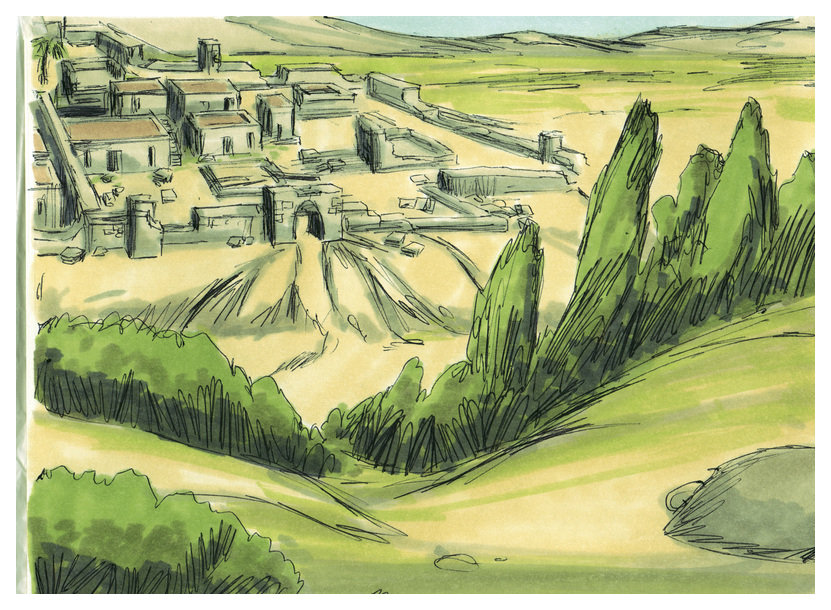
By Distant Shores Media/Sweet Publishing, CC BY-SA 3.0, https://commons.wikimedia.org/w/index.php?curid=18888543
In verse 5, the text assures us that Jesus loved Martha, Mary, and Lazarus. Why add this note? Could it seem like Jesus didn't care about Lazarus because he didn't immediately go help him?
What is Jesus' explanation for why he stays in verse 4? Do you think he knows what is going to happen? Why does he say Lazarus' illness will be for the glory of God?
Disciples Advise Jesus
6 So when he heard that Lazarus was sick, he stayed where he was two more days 7 and then said to his followers, “We should go back to Judea.”
8 They answered, “But Teacher, those Jews there tried to stone you to death. That was only a short time ago. Now you want to go back there?”
9 Jesus answered, “There are twelve hours of light in the day. Whoever walks in the day will not stumble and fall because they can see with the light from the sun. 10 But whoever walks at night will stumble because there is no light.”
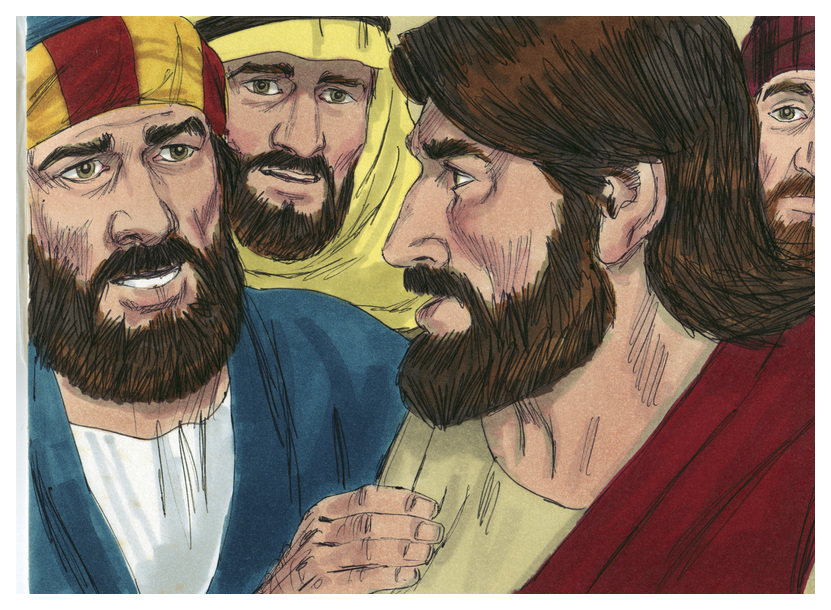
By Distant Shores Media/Sweet Publishing, CC BY-SA 3.0, https://commons.wikimedia.org/w/index.php?curid=18888551
In verse 8, why do the disciples not want Jesus to go to Judea?
In verse 9-10, how does Jesus' response answer their question? What does his statement mean?
Jesus says Lazarus Asleep
11 Then Jesus said, “Our friend Lazarus is now sleeping, but I am going there to wake him.”
12 The followers answered, “But, Lord, if he can sleep, he will get well.” 13 They thought Jesus meant that Lazarus was literally sleeping, but he really meant that Lazarus was dead.
14 So then Jesus said plainly, “Lazarus is dead. 15 And I am glad I was not there. I am happy for you because now you will believe in me. We will go to him now.”
16 Then Thomas, the one called “Twin,” said to the other followers, “We will go too. We will die there with Jesus.”

By Distant Shores Media/Sweet Publishing, CC BY-SA 3.0, https://commons.wikimedia.org/w/index.php?curid=18888551
In verse 11, why does Jesus refer to death as sleep when he clearly is aware that Lazarus is dead?
In verse 12, do Jesus' students always understand what he is talking about? Why not?
In verse 13-14, why does he first try to get his disciples to think of Lazarus as asleep and only later more literally say he is dead?
In verse 15, why does Jesus say he is glad he wasn't there when Lazarus died? Is Jesus being callous? Does he know what he's going to do? Do the disciples understand what he is going to do?
In verse 16, Does Thomas the disciple think that following Jesus will lead to resurrection and life in this story or to further death? Are the disciples supportive of Jesus' actions?
Martha
17 Jesus arrived in Bethany and found that Lazarus had already been dead and in the tomb for four days. 18 Bethany was about two miles from Jerusalem. 19 Many Jews had come to see Martha and Mary. They came to comfort them about their brother Lazarus.
20 When Martha heard that Jesus was coming, she went out to greet him. But Mary stayed home. 21 Martha said to Jesus, “Lord, if you had been here, my brother would not have died. 22 But I know that even now God will give you anything you ask.”
23 Jesus said, “Your brother will rise and be alive again.”
24 Martha answered, “I know that he will rise to live again at the time of the resurrection on the last day.”
25 Jesus said to her, “I am the resurrection. I am life. Everyone who believes in me will have life, even if they die. 26 And everyone who lives and believes in me will never really die. Martha, do you believe this?”
27 Martha answered, “Yes, Lord. I believe that you are the Messiah, the Son of God. You are the one who was coming to the world.”
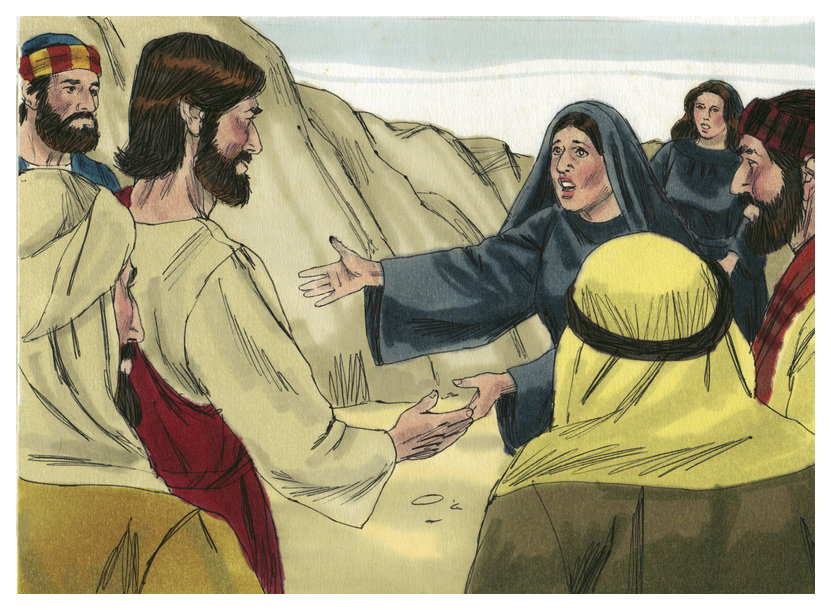
By Distant Shores Media/Sweet Publishing, CC BY-SA 3.0, https://commons.wikimedia.org/w/index.php?curid=18888553
In verse 21, Is Martha's initial greeting blaming Jesus for Lazarus' death?
In verse 22, why does Martha become more hopeful?
Does verse 23 indicate that Jesus knows what will happen?
In verse 24, what is Martha's understanding of Jesus's statement?
In verse 25-26, how does Jesus correct Martha's statement?
How does Martha change from verse 21 to her statement of faith in verse 27?
Martha returns to Mary
28 After Martha said these things, she went back to her sister Mary. She talked to Mary alone and said, “The Teacher is here. He is asking for you.” 29 When Mary heard this, she stood up and went quickly to Jesus. 30 He had not yet come into the village. He was still at the place where Martha met him. 31 The Jews who were in the house comforting Mary saw her get up and leave quickly. They thought she was going to the tomb to cry there. So they followed her.
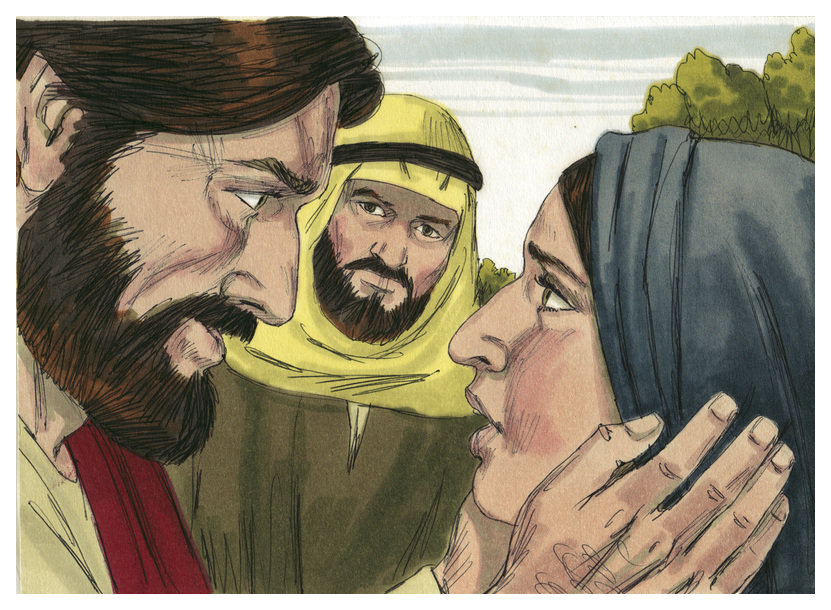
By Distant Shores Media/Sweet Publishing, CC BY-SA 3.0, https://commons.wikimedia.org/w/index.php?curid=18888555
Mary comes to Jesus
32 Mary went to the place where Jesus was. When she saw him, she bowed at his feet and said, “Lord, if you had been here, my brother would not have died.”
33 When Jesus saw Mary crying and the people with her crying too, he was very upset and deeply troubled. 34 He asked, “Where did you put him?”
They said, “Lord, come and see.”
35 Jesus cried.
36 And the Jews said, “Look! He loved Lazarus very much!”
37 But some of them said, “Jesus healed the eyes of the blind man. Why didn’t he help Lazarus and stop him from dying?”
38 Again feeling very upset, Jesus came to the tomb....
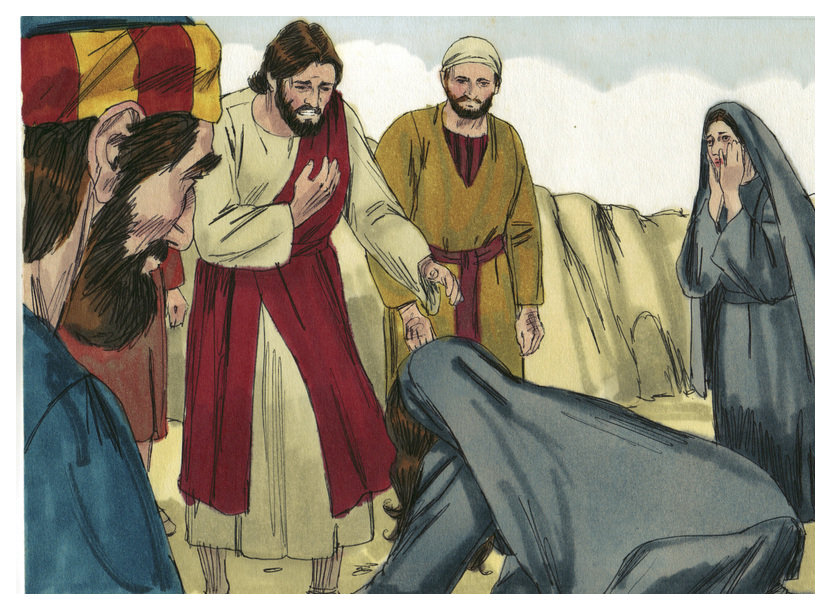
By Distant Shores Media/Sweet Publishing, CC BY-SA 3.0, https://commons.wikimedia.org/w/index.php?curid=18888558
In verse 32, Does Mary welcome Jesus or blame him?
In verse 33, everyone is weeping. Does anyone believe that Jesus can do anything to help the situation? The Greek word here being translated "deeply moved" is actually to feel displeasure or a rebuke and the word translated "greatly troubled" means unsettled. Why is Jesus feeling this way?
Of everyone in the story so far, who has any faith that Jesus can help the situation: a) his disciples, b) Martha, c) Mary, or d) the Jews comforting the family?
In verse 35, why does Jesus weep?
In verse 36, The Jews say that Jesus was capable of healing a blind man, couldn't he have done something to keep Lazarus from dying. Do they have any faith Jesus can do anything now?
In verse 38, the Greek word here being translated "deeply moved" is actually to feel displeasure or a rebuke. Why is Jesus feeling this way? What is going on around him that he is not pleased with?
...It was a cave with a large stone covering the entrance. 39 He said, “Move the stone away.”
Martha said, “But, Lord, it has been four days since Lazarus died. There will be a bad smell.” Martha was the sister of the dead man.
40 Then Jesus said to her, “Remember what I told you? I said that if you believed, you would see God’s divine greatness.”
41 So they moved the stone away from the entrance....
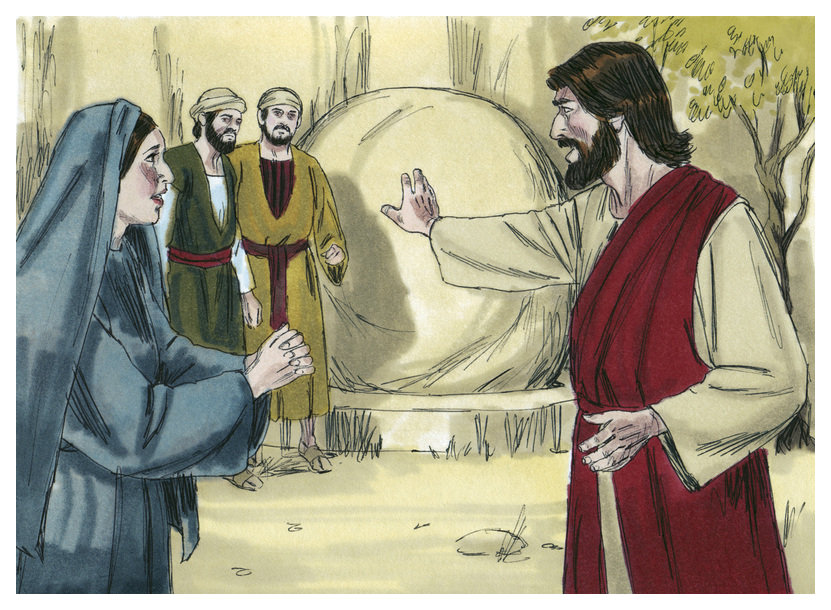
By Distant Shores Media/Sweet Publishing, CC BY-SA 3.0, https://commons.wikimedia.org/w/index.php?curid=18888560
In verse 39, Jesus gives a command. Do people want to follow the command? What does this verse show about Martha's faith?
In verse 40, how does Jesus' statement rebuke Martha's statement in the previous verse?
In verse 41, they finally obey Jesus' command. Does this indicate a change of thought?
Lazarus Awakens From Sleep
...Then Jesus looked up and said, “Father, I thank you that you heard me. 42 I know that you always hear me. But I said these things because of the people here around me. I want them to believe that you sent me.” 43 After Jesus said this he called in a loud voice, “Lazarus, come out!” 44 The dead man came out. His hands and feet were wrapped with pieces of cloth. He had a handkerchief covering his face.
Jesus said to the people, “Take off the cloth and let him go.”
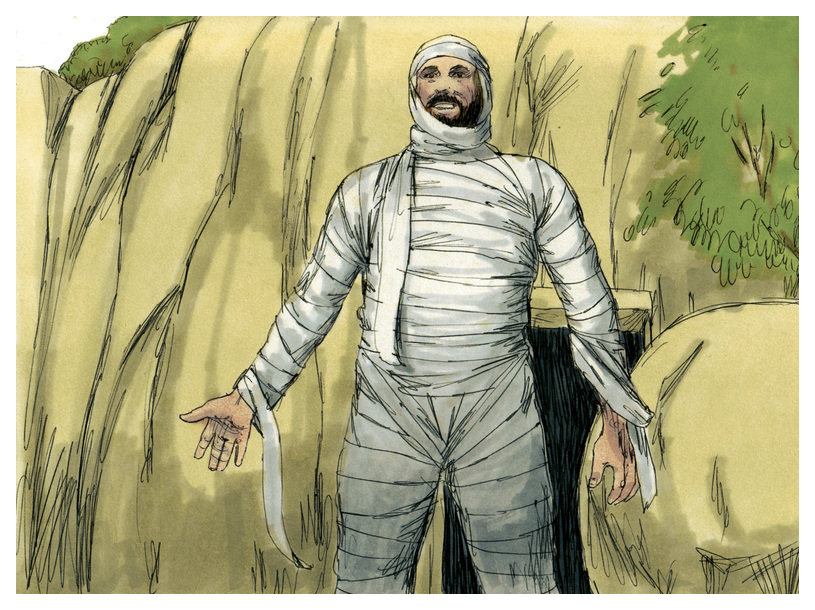
By Distant Shores Media/Sweet Publishing, CC BY-SA 3.0, https://commons.wikimedia.org/w/index.php?curid=18888571
In verse 41 and 42, Is Jesus confident? Why does he begin with giving thanks in this tragic situation? Did Jesus see the situation as tragic? Look again at verse 4 of this chapter.
In verse 42, what does Jesus know? What is he hoping the people around him will know? What is he hoping they will believe?
Discussion Questions
Was close reading this text helpful? What did you learn? What questions do you still have?
Taken from the HOLY BIBLE: EASY-TO-READ VERSION © 2001 by World Bible Translation Center, Inc. and used by permission.